Yo, what’s up, degenerate coffee-loving metalheads! Crypto Bro Charlie here, ready to drop some truth bombs on you about the most important beverage besides liquid courage: coffee. We’re talking about the journey of the bean, from the dirt to your mug, while keeping it ethical and eco-friendly. You know, because even a hardcore crypto bro cares about the planet (sometimes).
First off, let’s get real: most of that fair-trade, ethically-sourced coffee is complete bullshit. Big Coffee is a scam, just like the SEC. But there are some legit operations out there, and I’m about to spill the beans (pun intended). Think of it like finding the next 1000x shitcoin—you gotta do your research.
The Dirt on Sustainable Farming
Sustainable coffee farming is all about minimizing the environmental impact, and that’s crucial, my dudes. We’re talking about responsible water usage, preventing soil erosion, reducing chemical use—the whole nine yards. Think of it as a long-term investment; one that pays off better than any boomer crypto. Plus, responsible practices usually equate to better beans. The National Coffee Association has a bunch of info if you’re feeling extra nerdy.
One major problem is deforestation. Coffee cultivation can decimate habitats and biodiversity. But sustainable farms often use shade-grown methods to reduce their carbon footprint and support local ecosystems. It’s a win-win, bruh. It’s almost as exciting as discovering a juicy new shitcoin. Almost.
Ethical Treatment: Beyond Fair Trade
Ethical sourcing goes beyond just the environmental impact. It’s about ensuring fair wages, safe working conditions, and community development for the farmers and workers. Think of these farmers as your HODL crew—they are the backbone of the operation. Many certified organic coffee farms use more sustainable practices. The USDA gives the lowdown on organic certification.
Forget fair trade; we’re talking about TRUE transparency and traceability. Knowing exactly where your beans came from and ensuring the farmers are getting a fair shake is crucial. It’s like knowing you’re not getting rug-pulled by a shady DeFi project. Speaking of DeFi…did you know you can use crypto to invest in coffee? YOLO!
And if you need a mug to keep your ethically sourced coffee warm, check out our mothers day coffee mugs. They’re pretty rad.
From Farm to Cup: The Coffee Supply Chain
The journey of a coffee bean is a wild ride. It’s like a crypto asset’s path to the moon: complex, full of twists and turns and potential for massive gains (or epic losses). From harvesting to processing, roasting, and brewing, there are a bunch of steps involved. Each step impacts quality, environmental impact, and ethical considerations.
You need to track that bean’s journey, like I track my favorite shitcoins. Understanding the processes involved helps you make informed choices as a consumer. Supporting transparent brands is a bit like staking a promising project; you’re not only getting a good product but also supporting a good cause. And hey, a good cup of ethically sourced coffee tastes better. That’s like comparing a Lamborghini to a rusty Yugo.
If you prefer your coffee black and as merciless as your favorite death metal band, we’ve got the mug for you: our black coffee mugs. They’re brutal.
Brewing a Better Future
The bottom line, bruv? Choosing sustainable and ethically sourced coffee is a no-brainer. It’s like picking a solid crypto project with real utility—long-term benefits that make a difference. It’s a way to align your personal values with your daily ritual. Plus, a good cuppa joe always hits the spot. It’s like the perfect blend of caffeine and righteous anger to fuel your day.
Remember, you can make a difference with every sip. Support those doing it right. Stay woke. And most importantly, never stop chasing those moonshots.


